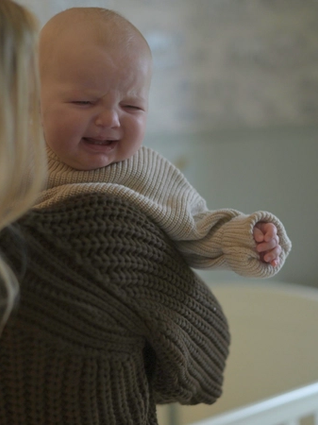
- Home
- Advice Hub
- Newborn
- Newborn Feeding Issues
- Colic In Babies: Symptoms, Advice & Treatment
Colic in Babies
Is your baby crying nonstop? Learn about colic in babies, its symptoms, and effective ways to soothe a colicky baby.
What is Colic?
Colic is the name given to excessive, frequent crying in a baby who appears to be otherwise healthy. A baby is considered to have colic if they cry for more than 3 hours a day, for more than 3 days a week and for more than 3 weeks. Crying is a natural part of a baby’s communication. It is how they express hunger or discomfort. Sometimes, however, a baby may cry for no clear reason.
In some cases, this fussiness can develop into prolonged, intense crying episodes that are difficult to soothe, which may be colic. Colic is very common affecting 1 in 5 babies, regardless of whether they're breast or formula-fed. Colic occurs equally in boys and girls and typically begins when a baby is just a few weeks old and usually resolves on its own by around four months of age. Many colicky babies tend to cry more frequently in the afternoon and evening.
This guide will explain what colic is, signs of colic in babies, what causes colic in babies, strategies for coping and when to seek medical advice.
Common symptoms of colic
Colic can be distressing for both babies and parents, as it often involves prolonged periods of inconsolable crying. Symptoms of colic in babies include:
- Clenching their fists
- Arching their back
- Or pulling their knees up to their tummy in discomfort
- Baby’s stomach might seem swollen or tight, sometimes accompanied by excessive wind or rumbling noises
- Their face may become red and flushed from continued crying
Colic symptoms in breastfed babies and formula fed babies look the same. Additionally, your usual techniques for soothing your baby such as feeding, cuddling, or a nappy change may have little or only temporary effect.
Although colic can be exhausting, it is not harmful. Your baby should continue to feed and gain weight as expected, and between crying spells, they will generally seem well. However, if you notice additional symptoms such as vomiting, fever, or signs of illness, it is important to seek medical advice. What distinguishes normal crying from colicky crying is that, in typical cases, a baby will eventually be comforted and settle. With colic, the crying is persistent, intense, and difficult to soothe.
What causes colic in babies?
The exact cause of colic remains unknown, but several theories suggest it may be caused by their developing digestive system. This makes it more difficult to digest breast milk or formula and causes discomfort for your baby. Some experts believe that hormonal changes could also play a role, temporarily affecting the muscles in the stomach and causing discomfort.
Another suggestion is that an imbalance in the natural gut bacteria may contribute to colic. As the digestive system matures, this imbalance usually corrects itself. Trapped wind is another possible cause with excess gas causing bloating and discomfort. In some cases, the symptoms of colic may be mistaken for acid reflux or gastro-oesophageal reflux disease (GORD), where a baby frequently brings up milk during or after feeds and appears unsettled. Environmental factors may also play a role, with research suggesting that exposure to tobacco smoke, either during pregnancy or after birth can increase the likelihood of colic.
How to soothe your baby
While colic can be challenging for parents, it is not harmful and is important to remember that newborn symptoms of colic in babies do usually settle at around 12 weeks. However, there are a number of strategies and natural remedies for colic in babies that may help.
Increasing your baby’s comfort can be beneficial, especially during crying episodes. Holding your baby close, carrying them in a sling while walking, or practising skin-to-skin contact may help them feel more secure and settled.
Adjusting feeding techniques can also make a difference, such as positioning your baby slightly more upright during feeds can help prevent them from swallowing excess air. Burping your baby after each feed and gently rocking them over your shoulder may further ease any trapped wind and reduce discomfort. Giving your baby a warm bath can be a soothing experience, helping to calm during unsettled periods. It is best to use only water for newborns, as they do not require soap for washing.
Additionally, playing gentle white noise or soft music may have a comforting effect, mimicking the sounds of the womb and helping your baby relax. Another useful technique is gently massaging your baby’s tummy, although this should be avoided immediately after a feed to prevent discomfort. These strategies may not completely stop colic, but they can provide comfort and reassurance to both baby and parents during this challenging phase.
Final thoughts
Colic is a condition that is not easily understood, it is thought to be a developmental stage affecting some babies that they usually grow out of around 12 weeks of age, although some babies take a little longer.
Having a baby with colic does not mean you are doing anything wrong, or that your baby is rejecting you. Looking after your own wellbeing is just as important as caring for your baby. If possible, seek support from family and friends, allowing yourself regular breaks to rest and recharge. Sleep deprivation and stress can make coping with colic even harder, so taking time for self-care if you can, is important.
Support groups, such as Cry-sis, can offer advice and reassurance to parents struggling with excessive crying. The Cry-sis helpline is available daily from 9am to 10pm on 0800 448 0737 for those looking for guidance or a listening ear.
When a baby is crying a lot, check with your health care professional to rule out any illness that may be causing colic type symptoms.
FAQs around colic
Colic typically begins in newborns at around two to three weeks of age. Colic often resolves by the time the baby is four months old, but in some cases it may persist until six months.
Yes, many colicky babies find comfort in being held or carried. Additionally, providing skin-to-skin contact or being cradled in a sling can provide a sense of security and help soothe them.
Colic itself does not cause changes in stool appearance. However, if your baby’s bowel movements seem abnormal (e.g. excessively watery, frothy or containing blood), consult your health care professional, as there may be another underlying cause.
It’s not advisable to let a colicky baby cry it out. Instead, responding to their needs with soothing techniques can help manage their distress and build trust.
Colic often occurs in the late afternoon or evening due to overstimulation, tiredness or natural hormonal changes that impact your baby’s digestion and mood.
Important Notice
We recognise that breastfeeding is best, providing many benefits to both mothers and infants. We also recognise that every parenting journey is unique, and we are here to support you through this journey, however you choose to feed your baby.
If you choose to breastfeed it is important that you eat a healthy well-balanced diet in preparation for and during breastfeeding. Before deciding to combination or formula feed your baby, note that reducing or stopping breastfeeding can be difficult to reverse. Babies feed on demand, so replacing breastfeeding with infant formula milk may reduce your supply. Formula feeding has both social and financial implications. Talk to your midwife or health visitor for guidance and support.
If you choose to use formula milk, make sure you choose the right milk for your baby’s age and prepare and store it according to the instructions on the packaging. Not doing so may make your baby ill. Infant formula is a nutritionally complete breastmilk substitute that can be used from birth. From 6 months you can choose to use follow on milk as part of a mixed diet and from 12 months you have the option to move onto growing up milk alongside a balanced diet.



